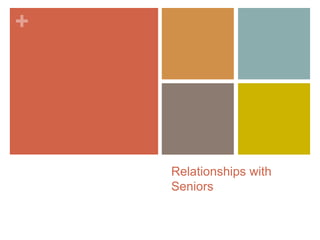
Relationship with seniors
- 1. + Relationships with Seniors
- 2. + Journal Do you look forward to getting old? What age is considered old? What are some benefits of old age? What are some disadvantages of old age?
- 3. + What Age is Old? At what age are you considered to be old? Infancy = 0-2 years old Preschool = 2-5 years old Childhood = 6-12 years old Adolescence = 12-17 years old Early Maturity = 17-25 years old Maturity = 25-55 years old Late Maturity = 55-75 years old Old Age = 75 years and older
- 4. + Grandparents What are some special things you have done with or remember about your grandparents? Is there any food you especially associate with your grandparents? How many of you have had a special relationships with either a grandparent or older friend or neighbor?
- 5. + Grandparents What do you see as the role of a grandparent? Grandparent Definition: The parent of your father or mother
- 6. + What do you have in common with the elderly? Both of you are at the crossroads in your lives and have anxieties about the future. The elderly are into the empty nest time of life. The youth are preparing to take on the nest. Your emotions cycle severely because of hormonal changes. The elderly’s hormones are shutting down. The youth’s hormones are becoming more active.
- 7. + What do you have in common? Your bodies are in a state of change. The elderly are slowing down. The youth are speeding up. You are both heavy users of drugs. The elderly use prescription drugs. The youth use substances.
- 8. + What do you have in common? You both are obsessed with excess time. The elderly person’s responsibilities have diminished. The full impact of the youth’s responsibilities is yet to come. You are both concerned about your independence. The elderly from their children. The youth from their parents.
- 9. + What do you have in common? You both suffer from dimensions of loneliness and depression because you are largely unemployed. The elderly are out of the work world and don’t feel needed anymore. The youth are not in the work world yet and don’t have the sense of being needed.
- 10. + What do you have in common? You are both preoccupied with driving The elderly to maintain driving status. The youth to begin driving. You are both victims of discrimination The elderly are too old. The youth are too young.
- 11. + What do you have in common? You are both prime candidates for abuse and criminal activity The elderly have lost their strength and the ability to defend themselves. The youth haven’t learned how to defend themselves yet.
- 12. + What do you have in common? You both face disapproval of any marriage plans. The elderly from their children. The youth from their parents. They don’t have much money. The elderly often live on social security or fixed incomes. The youth must depend on their parents for spending money.
- 13. + Memory Loss Study the following slide and remember all of the items you can. You will have two minutes to study the items.
- 14. +
- 15. + How many things can you remember? Take out a piece of paper and write down all the items you can remember.
- 16. + What Items Did You Remember? Kleenex Earrings Super Glue Fly Swatter Paint Brush Screw Driver Stapler Butterfinger Lotion Tennis Ball Chapstick Germ X Safety Pin Book Keys Pen Paper Clip Tide Pen Planner Shoe/Sandal Cell Phone Scissors Watch I-pod USB Camera Shoelaces Sticky Note Thread Ruler
- 17. + Athritis Using the duct tape found on the front table, tape your fingers together in the following manner: Pinky and ring fingers together Middle and index fingers together Do not tape your thumb
- 18. + Arthritis Now let’s see how well you can write! Take out another piece of paper. Write your first and last name in the top right hand corner of the paper. Number your paper from 1 to 10. Answer the following questions.
- 19. + Arthritis 1. What color of shirt are you wearing? 2. How many buttons are on your clothes today? 3. What is your favorite vacation spot? 4. What is your middle name, if you have one? 5. What color is the sky? 6. What is your favorite food? 7. How tall are you? 8. What color is your hair? 9. Do your shoes have laces? 10. Was this activity hard?
- 20. + Vision Simple Simon met a pieman going to the fair; Said Simple Simon to the pieman "Let me taste your ware" Said the pieman to Simple Simon "Show me first your penny" Said Simple Simon to the pieman "Sir, I have not any!" Simple Simon went a-fishing for to catch a whale; All the water he had got was in his mother's pail. Simple Simon went to look if plums grew on a thistle; He pricked his fingers very much which made poor Simon whistle. He went for water in a sieve but soon it all fell through; And now poor Simple Simon bids you all "Adieu"
- 21. + Summary Get to know your grandparents a little better. You may be surprised how much you have in common. You experienced a little of what elderly adults face every minute of everyday. Be more patient with them and help where you can.